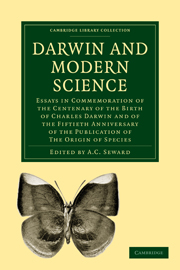 Darwin and Modern Science
Darwin and Modern Science Published online by Cambridge University Press: 07 September 2010
To no branch of science did the publication of The Origin of Species prove to be a more vivifying and transforming influence than to Palaeontology. This science had suffered, and to some extent, still suffers from its rather anomalous position between geology and biology, each of which makes claim to its territory, and it was held in strict bondage to the Linnean and Ouvierian dogma that species were immutable entities. There is, however, reason to maintain that this strict bondage to a dogma now abandoned, was not without its good side, and served the purpose of keeping the infant science in leading-strings until it was able to walk alone, and preventing a flood of premature generalisations and speculations.
As Zittel has said : “Two directions were from the first apparent in palaeontological research—a stratigraphical and a biological. Stratigraphers wished from palaeontology mainly confirmation regarding the true order or relative age of zones of rock-deposits in the field. Biologists had, theoretically at least, the more genuine interest in fossil organisms as individual forms of life.” The geological or stratigraphical direction of the science was given by the work of William Smith, “the father of historical geology,” in the closing decade of the eighteenth century. Smith was the first to make a systematic use of fossils in determining the order of succession of the rocks which make up the accessible crust of the earth, and this use has continued, without essential change, to the present day.
To save this book to your Kindle, first ensure no-reply@cambridge.org is added to your Approved Personal Document E-mail List under your Personal Document Settings on the Manage Your Content and Devices page of your Amazon account. Then enter the ‘name’ part of your Kindle email address below. Find out more about saving to your Kindle.
Note you can select to save to either the @free.kindle.com or @kindle.com variations. ‘@free.kindle.com’ emails are free but can only be saved to your device when it is connected to wi-fi. ‘@kindle.com’ emails can be delivered even when you are not connected to wi-fi, but note that service fees apply.
Find out more about the Kindle Personal Document Service.
To save content items to your account, please confirm that you agree to abide by our usage policies. If this is the first time you use this feature, you will be asked to authorise Cambridge Core to connect with your account. Find out more about saving content to Dropbox.
To save content items to your account, please confirm that you agree to abide by our usage policies. If this is the first time you use this feature, you will be asked to authorise Cambridge Core to connect with your account. Find out more about saving content to Google Drive.